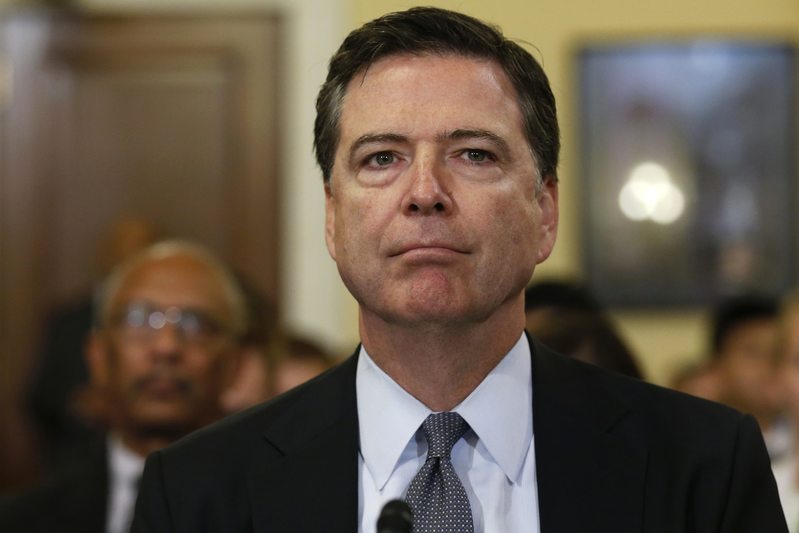The New York Times published a lengthy retrospective on Saturday about FBI Director James Comey’s decision to revisit the investigation into Hillary Clinton’s emails 11 days before the presidential election, offering fresh insight into Comey’s thinking and sparking a new debate over whether he cost Clinton the election.
Nate Silver, the editor in chief of FiveThirtyEight, said The Times’ report showed “the case that the Comey letter – or the media’s handling of the letter – cost Clinton the election is painfully obvious.”
On October 28, Comey wrote a letter to Congress saying that the FBI had learned of “the existence of emails that appear to be pertinent” to the investigation into Clinton’s email server, which had originally been closed in July. The emails were discovered as the FBI was examining former Rep. Anthony Weiner’s laptop, which he shared with his wife, Huma Abedin, a top Clinton aide.(Weiner had been accused of exchanging sexually explicit texts with a 15-year-old girl.)
The letter was promptly released by Utah Rep. Jason Chaffetz, the chair of the House Oversight Committee, and dominated the headlines of major media outlets in the days leading up to the election. Stocks fell sharply and Clinton’s poll numbers dropped by 3 points over subsequent days, Silver pointed out – a last-minute slip political scientists attributed to “the Comey effect,”according to The Times.
Then, on Election Day, Clinton lost Florida, Wisconsin, Pennsylvania, and Michigan - each by less than 1 percentage point.
It's a fairly open-and-shut case. But the media's election post-mortems have mostly ignored it because it implicates the media's judgement. pic.twitter.com/cBLifP9WLu
— Nate Silver (@NateSilver538) April 22, 2017
"Not complicated," Silver said. "Clinton was up by a lot. Comey letter hits. Treated as massive story. Suddenly she was up by not-a-lot. She loses narrowly."
'Starkly different' approaches
Silver received pushback for concluding that Comey's letter - reportedly the result of weeks of deliberation over how the FBI should proceed after it uncovered the new emails in early October - was so consequential.
Many say Clinton's loss was her own fault and she has been using the Comey letter as a scapegoat. (Her campaign has publicly blamed Comey for the loss.) Journalist Ron Fournier, for example, shot back at Silver's argument with a link to a piece he wrote in July 2016 titled "Hillary Has No One to Blame But Herself."
"When I wrote this column, you were still predicting a Clinton win," Fournier told Silver. "Nice work."
The back-and-forth quickly descended into a feud over "how probability works," as Silver put it. But few doubt that Comey's revelation had a negative effect on Clinton's candidacy, even if it was not enough to swing the election at the last minute.
Whereas many Clinton backers felt vindicated by Comey's revelation last month that the FBI had been investigating Trump and his associates for their ties to Russia since last July, others were outraged that Comey broke FBI protocol to disclose the existence of new Clinton emails just days before the election, but didn't tell voters that Trump was also under FBI investigation until four months after the election.
People familiar with Comey's thinking told the Times that he wanted to shield the FBI from what he perceived to be then-Attorney General Loretta Lynch's bias toward Clinton, which prompted him to handle the Clinton and Trump investigations "in starkly different ways."
But the different approaches didn't go unnoticed. Democratic Rep. Jerrold Nadler confronted Comey about the appearance of a double standard during a congressional hearing, after then-Senate Minority Leader Harry Reid, who had been briefed on aspects of the Trump-Russia probe by CIA Director John Brennan, wrote a letter to Comey imploring him to go public.
"After you investigated Secretary Clinton, you made a decision to explain publicly who you interviewed and why," Nadler said to Comey. "You also disclosed documents, including those from those interviews. Why shouldn't the American people have the same level of information about your investigation with those associated with Mr. Trump?"
According to The Times, "Mr. Comey never considered disclosing the case. Doing so, he believed, would have undermined an active investigation and cast public suspicion on people the FBI could not be sure were implicated."

